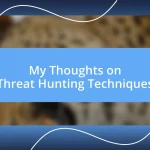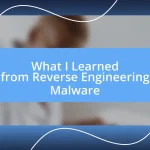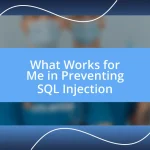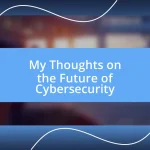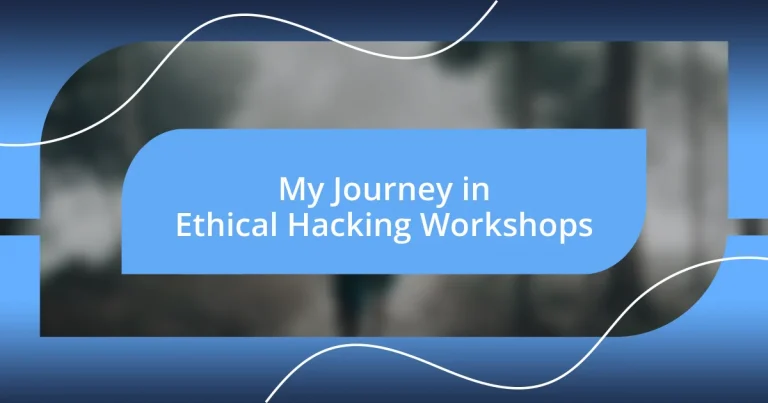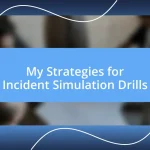Key takeaways:
- Ethical hacking workshops offer a blend of theory and hands-on experience, fostering a collaborative environment that inspires innovation and lasting connections.
- Key skills developed include critical thinking, effective communication, and adaptability, essential for navigating the dynamic field of cybersecurity.
- To maximize workshop experiences, actively engage in discussions, keep a journal for reflections, and build genuine relationships for future collaboration and mentorship.
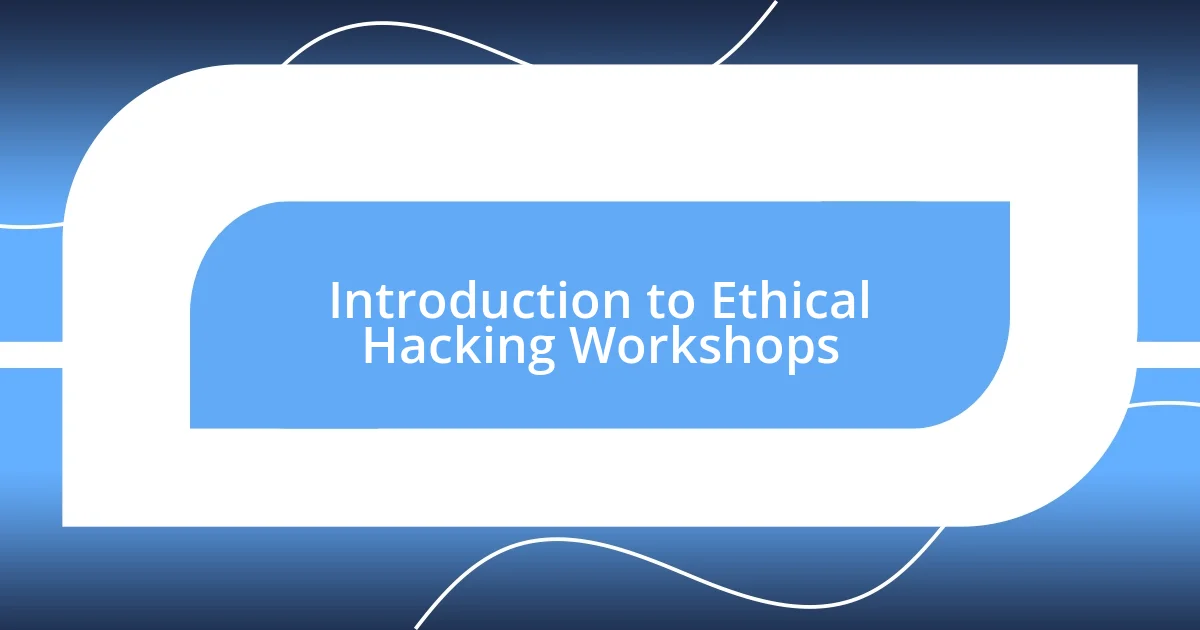
Introduction to Ethical Hacking Workshops
Ethical hacking workshops are an incredible gateway into the world of cybersecurity. I remember my first workshop—sitting in a room filled with like-minded individuals, all eager to learn the ins and outs of hacking, and it felt electric. Have you ever been in an environment where everyone shares the same passion? The excitement was palpable, and it fueled my desire to dive deeper into this fascinating field.
These workshops provide a unique blend of theory and hands-on experience. I recall spending hours analyzing real-world scenarios, which not only sharpened my skills but also illuminated the responsibilities that come with being an ethical hacker. What better way to grasp the complexities of security breaches than to “walk in the shoes” of both attackers and defenders?
Moreover, they create a supportive community that fosters collaboration and growth. I often found myself exchanging insights with instructors and fellow participants. Isn’t it amazing how the right environment can inspire and cultivate innovation? These interactions often lead to lasting connections and opportunities, underscoring the value of such workshops in one’s professional journey.
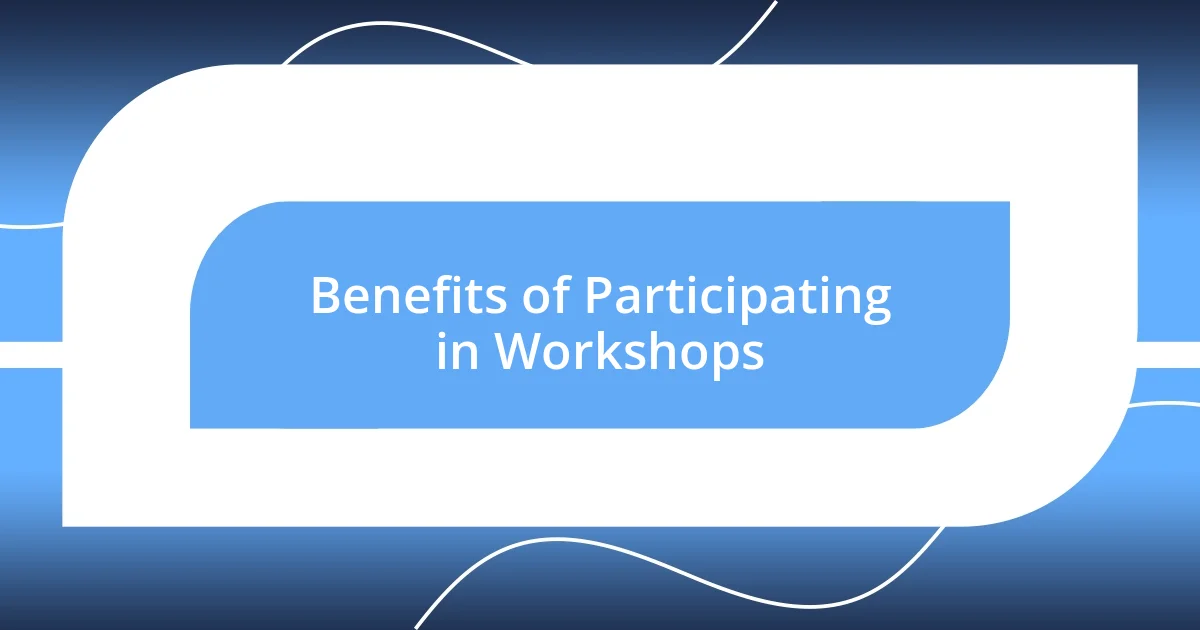
Benefits of Participating in Workshops
Participating in workshops can significantly elevate your skills and confidence in ethical hacking. I vividly remember the hands-on challenges where I had to think like a hacker, trying to penetrate systems while also learning how to fortify them. That rush of solving real-world problems alongside peers not only solidified my knowledge but ignited a passion I didn’t know I had. It’s truly incredible how that collaborative spirit pushes you to new heights.
Here are some benefits of joining these workshops:
– Networking Opportunities: Build lasting relationships with industry professionals and fellow enthusiasts.
– Practical Experience: Gain hands-on training that reinforces theoretical knowledge.
– Expert Insights: Learn from seasoned instructors who share invaluable tips from their careers.
– Confidence Boost: Overcoming challenges in a supportive environment enhances your ability to tackle complex problems.
– Diverse Perspectives: Exposure to different viewpoints enriches your understanding of cybersecurity challenges and solutions.
Reflecting on my own journey, each workshop has been a steppingstone, propelling me forward in ways I never anticipated. The feeling of accomplishment after completing tough exercises was exhilarating and continues to motivate me even today. It’s these experiences that shape not just your skill set but also your outlook on the entire field of cybersecurity.
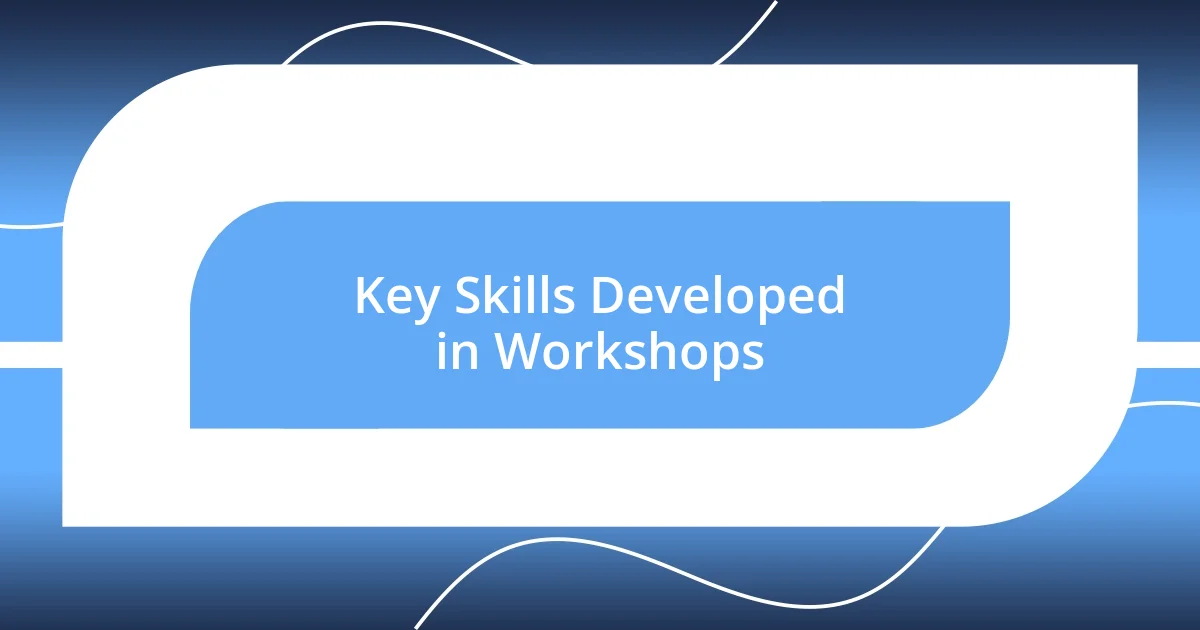
Key Skills Developed in Workshops
The skills I developed in ethical hacking workshops have been nothing short of transformative. One of the key skills I gained was the ability to think critically in high-pressure situations. I remember one particular exercise where we had to simulate a cyber-attack on a mock system while the clock ticked away. The adrenaline rush was real, pushing me to analyze vulnerabilities quickly and devise strategies to counteract them. It taught me not just to react, but to anticipate threats.
As workshops progressed, I discovered the art of communication in technical environments. I recall sitting around a table filled with diverse minds, each presenting our findings after an analysis session. Explaining complex ideas in simple terms became essential. It was a valuable lesson, not just for collaboration but also for pursuing career opportunities. Being able to convey your thoughts clearly can set you apart in a field that often gets lost in technical jargon.
Lastly, my ability to adapt and learn continuously has been honed during these workshops. One of my instructors frequently highlighted the ever-evolving nature of cybersecurity. I vividly remember a moment during a hands-on lab, where we had to ad-lib our approaches when unexpected challenges arose. Embracing that flexibility has since become a cornerstone of my professional practice; understanding that no two security breaches are alike is crucial.
| Skill | Description |
|---|---|
| Critical Thinking | The ability to analyze and respond to threats quickly, developed through hands-on simulation exercises. |
| Communication | The skill to articulate complex ideas simply, important for collaboration and professional advancement. |
| Adaptability | The capacity to adjust to new challenges in dynamic environments, crucial for staying relevant in cybersecurity. |

Workshop Formats and Learning Approaches
When it comes to workshop formats, I’ve experienced a few different styles that each bring their own flavor to the learning experience. For instance, the hands-on labs were my favorites, immersing us into real-life scenarios where I felt both the thrill of hands-on engagement and the responsibility of tackling authentic cyber threats. I remember diving into a live simulation, surrounded by fellow hackers, where we had to patch vulnerabilities on the fly. That adrenaline and teamwork made it a historical moment for me, sparking unforgettable memories.
Conversely, the lecture-based sessions provided me with structured knowledge and theoretical frameworks. While they might seem less exhilarating, I found their value in laying a solid foundation of concepts. I recall one instructor passionately explaining the intricacies of specific exploits, and it felt like unlocking a treasure chest of knowledge. Questions bubbled up in my mind, and I realized how valuable that exchange was. Engaging with experts gives a depth to the learning that you don’t always get in a more informal setting.
Then there are networking sessions, which often feel like a double-edged sword. I consistently wrestled with shyness, but stepping into these environments taught me the power of collaboration. Meeting professionals who shared their career stories inspired me to push my boundaries. I distinctly remember one evening, connecting with a cybersecurity analyst over a casual discussion about current threats; that conversation ignited my ambition to deepen my understanding. So, what’s holding you back from diving into these diverse formats? It’s a rich journey waiting to unfold!
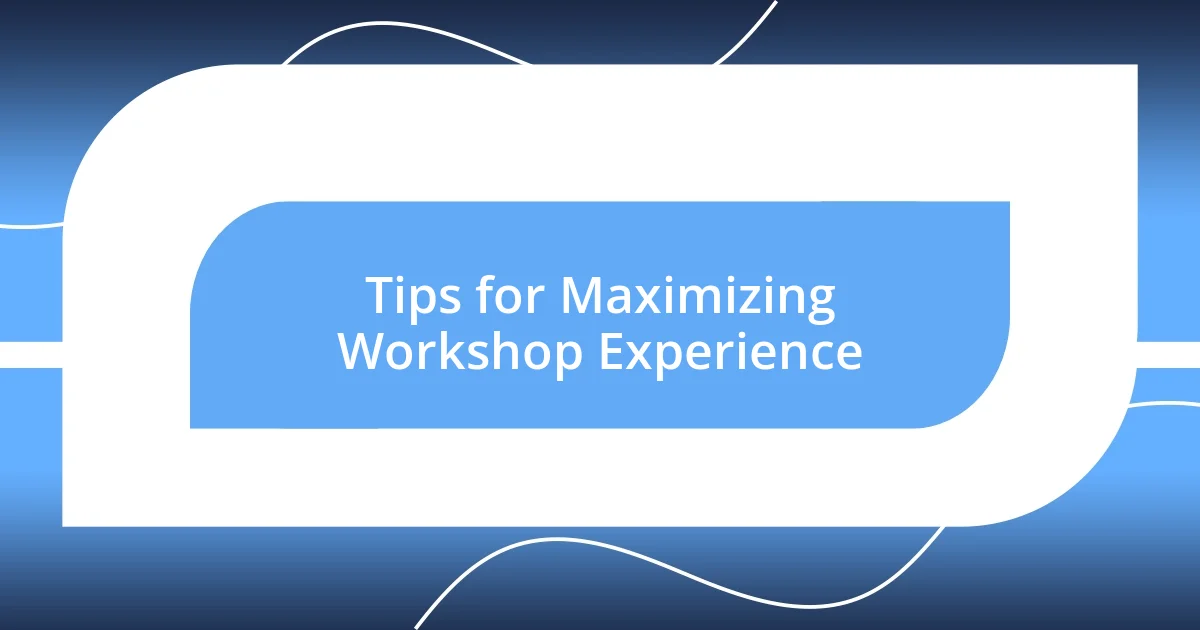
Tips for Maximizing Workshop Experience
To truly maximize your experience in ethical hacking workshops, I highly recommend actively participating in discussions and asking questions. One memorable moment for me was during a particularly intense session when I dared to ask about a complex topic I was struggling with. The instructor not only addressed my question but also sparked a deeper conversation that allowed others to share their insights. I felt a rush of confidence as we collectively explored the subject, highlighting how valuable engagement can be for everyone involved.
Another tip is to keep a journal of your experiences and breakthroughs throughout the workshop. I started this habit after my first workshop and found that jotting down my thoughts and reflections helped solidify what I learned. When I look back at those pages, it’s like reliving those “aha!” moments. They become your personal roadmap, guiding you through the complexities of cybersecurity long after the workshop ends. Have you ever thought about how writing can serve as a powerful tool for retention and growth?
Lastly, I believe it’s essential to network genuinely with fellow participants. I once found myself chatting with a peer during a coffee break, bonding over our shared struggles in the field. That simple exchange evolved into a mentorship, broadening my perspective on ethical hacking. Building these connections can lead to opportunities and collaborations that you may never have considered. Doesn’t it make you wonder how many valuable relationships are waiting to form just by reaching out?
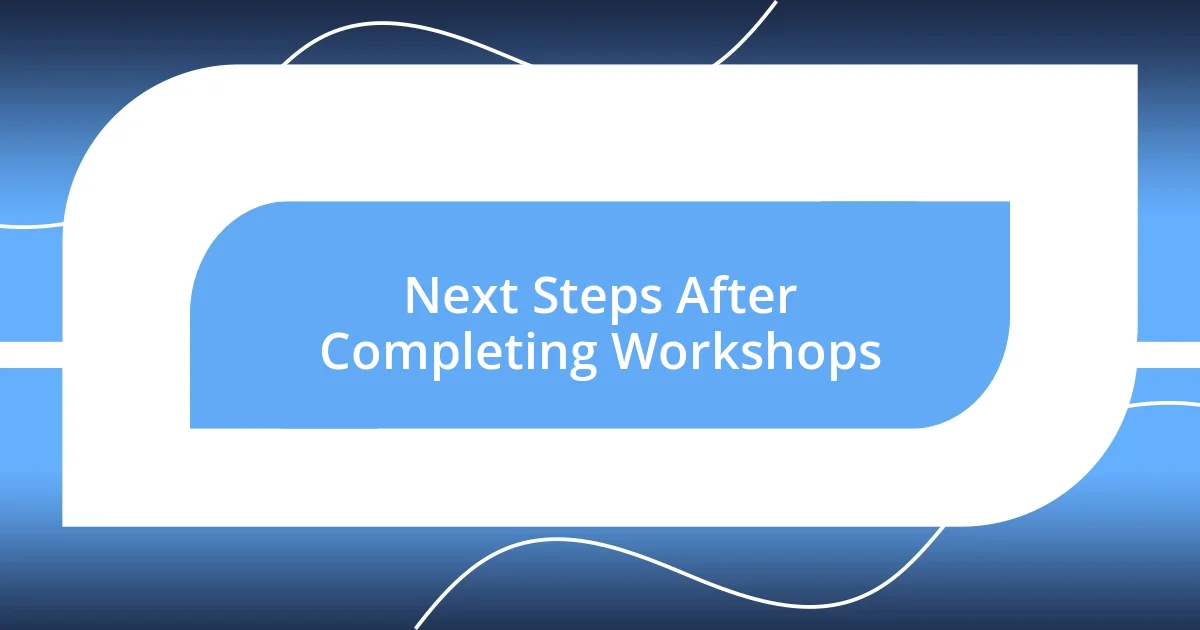
Next Steps After Completing Workshops
After completing your ethical hacking workshops, the next crucial step is to put what you’ve learned into practice. I remember feeling a mix of excitement and nervousness the first time I set up my own lab environment at home. The thrill of experimenting with new tools and techniques was intoxicating. Why not give it a shot? Building your own lab can reinforce those concepts and help you feel more confident tackling real-world scenarios.
Engaging with online communities can also be a game-changer. I still recall the first time I joined a cybersecurity forum where I could ask questions and share my experiences. The support was overwhelming! It not only expanded my knowledge but also connected me with others on similar journeys. Isn’t it fascinating how sharing challenges and breakthroughs fosters a sense of belonging?
Lastly, consider pursuing certifications relevant to your newfound skills. After my workshops, I dove into preparing for certification exams. The sense of accomplishment I felt when I passed was exhilarating and opened doors I didn’t even know existed. How empowering is it to have credentials that validate your hard work and dedication? This step is not just about titles; it’s about advancing your career and boosting your confidence in this evolving field.

